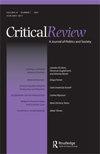Beyond the Cold War: Isaiah Berlin for the Twenty-First Century
IF 1.7
3区 社会学
Q4 POLITICAL SCIENCE
引用次数: 0
Abstract
ABSTRACT Isaiah Berlin’s “Two Concepts of Liberty” is clearly set within a Cold War context. However, its framework of ideas is also applicable to a range of twenty-first century social and political issues. First, Berlin’s “inversion thesis” concerning liberty captures a salient pattern of thought in radical Islamism. Second, his understanding of the power of belonging and recognition bears significantly on the rise of authoritarian nationalism and populism. Third, his value pluralism implies a critique of global neoliberalism and support for egalitarian liberalism or social democracy. Thus, Berlin’s framework provides us with a set of useful tools for understanding and responding to some of the most urgent political problems that trouble us now. But this framework has limitations and needs to be supplemented by thinking that goes beyond Berlin.冷战之外:21世纪的以赛亚·柏林
摘要以赛亚·伯林的“两个自由概念”显然是在冷战背景下提出的。然而,它的思想框架也适用于21世纪的一系列社会和政治问题。首先,柏林关于自由的“倒置论”抓住了激进伊斯兰主义的一个突出思维模式。其次,他对归属和承认的力量的理解与专制民族主义和民粹主义的兴起有着重要的关系。第三,他的价值多元主义意味着对全球新自由主义的批判和对平等自由主义或社会民主的支持。因此,柏林的框架为我们理解和应对目前困扰我们的一些最紧迫的政治问题提供了一套有用的工具。但这一框架有局限性,需要通过超越柏林的思考加以补充。
本文章由计算机程序翻译,如有差异,请以英文原文为准。
求助全文
约1分钟内获得全文
求助全文
来源期刊

Critical Review
POLITICAL SCIENCE-
CiteScore
1.30
自引率
12.50%
发文量
17
期刊介绍:
Critical Review: A Journal of Politics and Society is a political-science journal dedicated to advancing political theory with an epistemological bent. Recurrent questions discussed in our pages include: How can political actors know what they need to know to effect positive social change? What are the sources of political actors’ beliefs? Are these sources reliable? Critical Review is the only journal in which the ideational determinants of political behavior are investigated empirically as well as being assessed for their normative implications. Thus, while normative political theorists are the main contributors to Critical Review, we also publish scholarship on the realities of public opinion, the media, technocratic decision making, ideological reasoning, and other empirical phenomena.
 求助内容:
求助内容: 应助结果提醒方式:
应助结果提醒方式:


